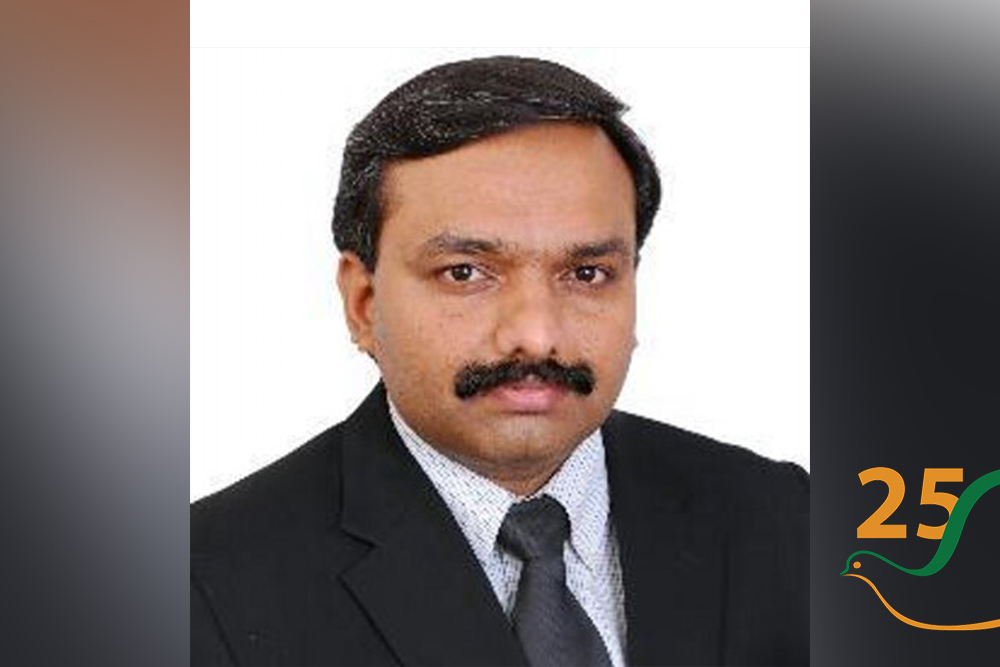During the 2019-20 academic year, as the Center for Justice and Peacebuilding commemorates its 25th anniversary, a series of guest authors will share reflections about CJP’s personal impact.
We want to hear your thoughts, too! Thousands of people have intersected with CJP over the years, and each of you has contributed to the work of making the world a more just and more peaceful. Join us for our anniversary celebration June 5-7, 2020. Visit the anniversary website for more details.
Read reflections by Phoebe Kilby, Muhammad Abu-Nimer, Maryam Sheikh and Howard Zehr and Ruth Zimmerman and Shyamika Jayasundara-Smits.
Sanjay Pulipaka MA ’07 is a senior fellow at the Nehru Memorial Museum Library in New Delhi, India. The title of his guest post is “Conversations and Revisiting Conceptual Delineations.”
At the Center for Justice and Peacebuilding, I had learnt that organisations, like humans, go through various phases such as infancy, adolescence, adulthood and old age. However, organisational life span, unlike humans, can either be a few months or a few hundred years. On its 25th anniversary, I wish CJP a long and healthy life. In my language we say , “వేయ్యేళ్ళు వర్ధిల్లు” (may you prosper for a thousand years). Anniversaries are important occasions to not only celebrate the success but also to ponder on the way forward and I am glad that I have been part of the center’s journey.
Let me confess, like many of my friends, I wondered as to why the US Department of State chose the CJP to host the Fulbright Program in Peace and Conflict Studies. After two years of study and a decade later, I would emphatically say that the State Department made the right decision. Every day, a bunch of young and not so young people (like me) would sit around in a circle to discuss peace and conflict issues in the campus. When I use the word “bunch,” it does not capture the remarkable diversity of the classroom. There were people from across the political divides – Israelis and Palestinians, Indians and Pakistanis, from-here and came-here, Tamils and Sinhalas from Sri Lanka, and Buddhists and minorities from Burma. There were people from larger conflict zones such as Iraq, Syria and Lebanon, as well as from Kenya, Ethiopia and Somalia. Looking back, I marvel at the audacity of CJP in hosting people from such intense conflict regions, all in one classroom, and hoping to facilitate conversations between them. The fact that the South Asians learnt to prepare hummus and the Middle Easterners learnt to prepare dal was an indication that the conversations were fairly successful. These conversations are continuing even though we are now in different countries. Some of us replay conversations that we had with our friends at the CJP who are no longer with us now. Importantly, through these conversations, we acquired humility to recognise complexities in conflicts.
In India, I received excellent training in political science. I acquired tools to understand political power and understood the institutions as well as processes through which it is mediated. I know this sounds terribly cliched, but at CJP I understood the meaning of finding one’s voice and was acquainted with the art of silent listening. Silence here does not mean passivity, it constitutes an active exercise. CJP gave me three important principles: first, “world views” matter. Before denouncing or validating a statement, it is imperative to pause and examine the world view with which an argument was articulated. Therefore, respecting a different view does not imply agreeing to it. Rather, it implies recognising the context from which a different view is emanating. Second, justice is not an exercise in the infliction of pain or facilitating financial compensation. Justice is about recognising and repairing the harm done to individuals and relationships. Third, keep track of your emotions and what they are doing to you when reflecting on divisive and on less contentious issues as well.
With the advent of social media and other communication technologies, peacebuilders today will have to work simultaneously at various levels (Track-I, Track-II and Track-III). The conceptual delineation of peacebuilders area of work into political and civil society requires re-evaluation. A single tweet from a politician in power or actions by a small collective of individuals can either strengthen or rip apart communities as well as political institutions. Therefore, peacebuilders today must acquire skills as well as emotional resilience to work across various spaces. I hope the CJP will gain more strength as an institution that trains peacebuilders to simultaneously work at various levels and spaces. I also hope the CJP remains as a cross-cultural and a multinational space to reflect on peace and conflict issues.
Sanjay Pulipaka is a senior fellow at the Nehru Memorial Museum Library. He was a Pavate Visiting Fellow at the University of Cambridge, UK, and a former Fulbright Fellow at CJP.
His areas of interest include India’s foreign policy, China, East Asian security issues, India-US Relations, regionalism, connectivity issues, Indian politics and other related domains. Further, he has been closely following the political transition in Myanmar and conducted field research in that country and in Northeast India.
He has a substantive publication record with co-edited volumes, policy reports, numerous research papers and op-ed essays. Sanjay also has extensive work experience with think-tanks and civil society organisations in India, and professional experience in strengthening participatory political processes, governance frameworks and platforms for wider consultation.
* The views expressed here are personal.
